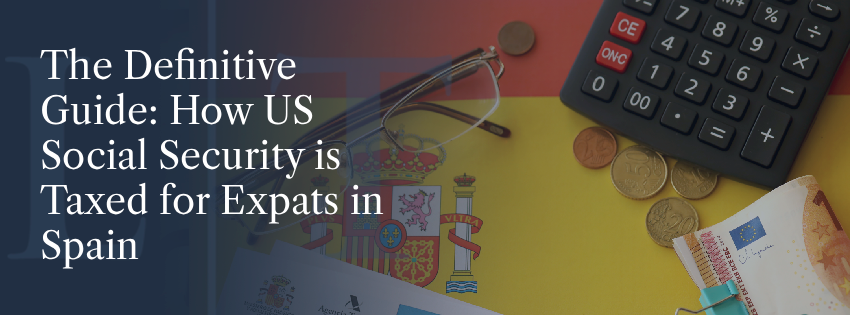Quick Guide for US Expats in Spain:
✅ Taxed Only in the US: US Social Security benefits do not pay direct tax in Spain.
🇪🇸 Exempt by Treaty: Article 20 of the Double Taxation Treaty makes it exempt in Spain.
📝 Mandatory Declaration: Despite being exempt, you must declare it on your Spanish Personal Income Tax (IRPF) return.
📈 Impacts Your Tax Rate: A rule called «exemption with progression» applies, meaning it can increase the tax rate you pay on your other income.
🔁 No Double Taxation: The system is designed so you don’t pay tax twice on the same income.
Living in Spain on Your US Pension: What You Need to Know
Retiring in Spain is a dream for many Americans. But the tax question always comes up: what happens to my Social Security benefits? Will I be taxed in Spain after already paying the IRS?
This guide gives you a clear and accurate breakdown of how US Social Security is taxed in Spain, based on the official treaty rules—not guesswork.
How Does the Spain-US Tax Treaty Protect Your Income?
The Double Taxation Treaty between Spain and the United States, in effect since 1990, is the key document that prevents you from being taxed twice on the same money. It establishes which country has the right to tax each type of income.
For a resident of Spain receiving a US pension, this treaty is your most important safeguard
Article 20: The Golden Rule for US Social Security
This article of the treaty is unambiguous when assigning taxing rights:
- Public Pensions (Social Security): The right to tax these benefits belongs exclusively to the United States. (Article 20(1)(a)).
- Private Pensions: Private pensions from past employment are taxed where you reside, which means in Spain. (Article 20(1)(b)).
In short: if you live in Spain and receive US Social Security, Spain cannot tax that income.
The Key Obligation in Spain: Declare It, Even Though It’s Exempt
Being a tax resident in Spain means you must declare your worldwide income on the Personal Income Tax (Impuesto sobre la Renta de las Personas Físicas – IRPF) return.
Who is a Tax Resident in Spain?
You are considered a tax resident if you meet any of these conditions:
- You spend more than 183 days a year in Spain.
- Your main center of economic or professional interests is in Spain.
- Your spouse or dependent minor children reside in Spain.
As a resident, even though the treaty prevents Spain from taxing your Social Security, you still have a critical obligation.
The «Exemption with Progression» Mechanism
This is the crucial detail that is often overlooked: although your Social Security is exempt, you must include it on your IRPF return.
Why? Because Spain applies a rule called exemption with progression. This means:
- The amount of your Social Security is not taxed itself.
- However, that amount is added to your other income (private pensions, interest, rental income) to calculate the applicable tax rate.
Practical Example: If you have a private pension of $20,000, you might fall into a 24% tax bracket. But if you add $15,000 of exempt Social Security for the calculation, your «theoretical» total base is $35,000, which could push your tax rate up to 30%. That 30% rate would then be applied only to the taxable $20,000 from the private pension.
Failure to declare this income can lead to audits and penalties from the Spanish Tax Agency (Agencia Tributaria or Hacienda).
What About Taxes in the United States?
While Spain exempts your Social Security, the United States reserves its right to tax it.
As a US citizen, you are still required to file a federal tax return (Form 1040). The IRS can tax up to 85% of your Social Security benefits, depending on your «combined income» (which includes other pensions, earned income, etc.).
Special Cases and Other Pensions
- US Government and Military Pensions: These are covered by Article 21 of the treaty. Generally, they are only taxable in the US. The exception is if you are a Spanish citizen but not a US citizen; in that case, Spain may have the right to tax it.
- Private Pensions, 401(k)s, IRAs: As mentioned, these pensions are taxed in your country of residence. If you are a tax resident in Spain, this income is declared and taxed in Spain. You can then claim a Foreign Tax Credit on your US return for taxes paid to Spain to avoid double taxation.
- Dual US-Spanish Citizenship: The situation remains the same. The treaty applies equally, and the «tie-breaker» rules for tax residency within the treaty will determine that, for tax purposes, you are a resident of Spain, so the rule in Article 20 prevails.
Your Tax Checklist for Retiring in Spain as a US Citizen
✅ Confirm your tax residency status.
✅ Identify your pension types: public (Social Security) vs. private (401k, IRA).
✅ Declare ALL your income on the Spanish IRPF, applying exemption with progression for Social Security.
✅ File your US tax return (Form 1040).
✅ Keep all your documents: SSA-1099 forms, 1040s, and notes on applying the treaty.
🧠 Consult a tax advisor who is an expert in Spain-US international taxation.
Frequently Asked Questions (Clear Answers)
Do I have to pay tax in Spain on my US Social Security?
No, you do not pay tax directly on it. It is exempt thanks to Article 20 of the tax treaty.
So I don’t need to include it on my Spanish tax return?
You absolutely must declare it. It is used to calculate the tax rate that will apply to your other income (this is the «exemption with progression» rule).
Can US Social Security increase my taxes in Spain?
Indirectly, yes. By being added to calculate your tax bracket, it can cause you to pay a higher percentage on your other taxable income, like a private pension or 401(k).
What about my private pension or 401(k)?
That income is fully taxable in Spain if you are a tax resident here.
How do I make sure I apply the treaty correctly?
The best way is to work with a tax advisor. They will ensure your Social Security is listed as exempt income in the correct box of your IRPF (Form 100) and that the progression calculation is applied correctly.
Do I really need a tax advisor?
For cross-border tax matters, it’s essential. An expert ensures compliance, avoids costly mistakes and penalties, and provides complete peace of mind.
In Summary: Enjoy Your Retirement with No Tax Surprises
The Spain-US tax treaty provides you with certainty: your Social Security pension is only subject to tax in the United States. However, compliance in Spain requires you to declare it correctly to apply the exemption with progression rule.
By knowing the rules and getting the right support, you can enjoy your life in the Spanish sun without worrying about double taxation.
Need Expert Help?
📞 Book a free consultation with Lextax, your expert legal and tax partner for expats in Spain.
From taxes and visas to wealth planning and inheritance, we help foreign nationals protect their future in Spain.


